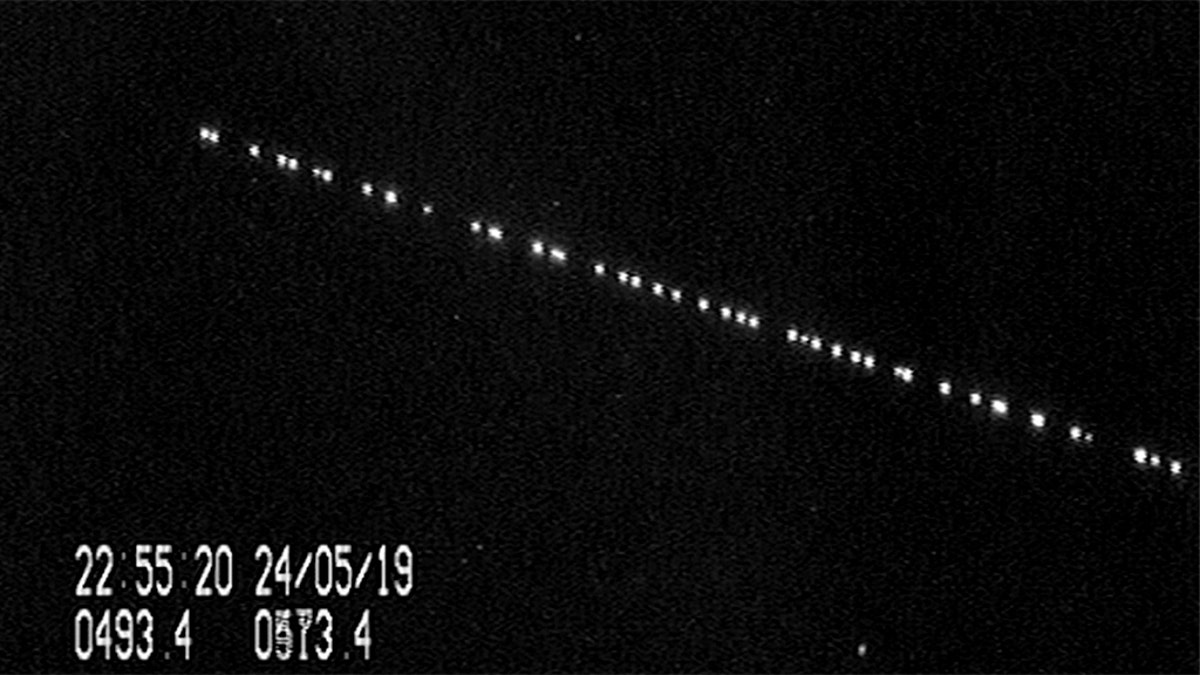SpaceX satellite launch had some thinking an alien armada has arrived
SpaceX launched a batch of satellites. Just over 24 hours later, the bright lights of the spacecraft caused confusion, leading several people to think extraterrestrial life-forms were visiting Earth.
Despite the hysteria, that wasn't a UFO that was seen over the Netherlands sky Saturday night. It's just the latest innovation from Elon Musk.
Astronomer and author Marco Langbroek managed to capture an incredible image of Musk's SpaceX Starlink satellites after they were shortly deployed, showcasing them in a "train-like" formation.

(Credit: Marco Langbroek)
"There were no orbital elements for the objects available yet on Space-Track, but based on the orbital information (53 degree inclination, initially 440 km orbital altitude) I had calculated a search orbit and stood ready with my camera," Langbroek wrote in a blog post on May 25. Langbroek said that he counted 56 satellites, although there were 60 satellites in total.
NEW SATELLITES COULD SAVE AMERICANS $30B ON MONTHLY INTERNET BILLS, REPORT SAYS
"My search orbit turned out to be not too bad: very close in sky track, and with the objects passing some 3 minutes early on the predictions," he continued. "And what a SPECTACULAR view it was!"
Langbroek, who noted that the anomaly caused it to "rain UFO reports," which the press picked it up as well, also uploaded a video of the rare phenomena to Vimeo.
The Starlink satellites were launched from Cape Canaveral on May 23, the first launch of many that SpaceX and Musk hope will provide satellite broadband internet access to customers around the world, including in remote areas.
There have been some concerns that the satellites would add to the "space debris," phenomena, but Musk has repeatedly said that they would not affect astronomy.
"There are already 4900 satellites in orbit, which people notice ~0% of the time," Musk wrote on Twitter, in response to a question whether he worried about the satellites adding to space debris and polluting the sky. "Starlink won’t be seen by anyone unless looking very carefully & will have ~0% impact on advancements in astronomy. We need to move telelscopes to orbit anyway. Atmospheric attenuation is terrible."
He added that there would be an economic benefit to launching the satellite service by "potentially helping billions of economically disadvantaged people."
SpaceX has previously said that the Starlink satellite system would reach “significant operational capacity” once it has 800 satellites in orbit.
A new report from BroadbandNow said that the Low Earth Orbit (LEO) satellites from Musk’s SpaceX Starlink project and Jeff Bezos’ Project Kuiper could save American households more than $30 billion per year by introducing more broadband competition.
ELON MUSK GOES AFTER BEZOS' MOON LANDER WITH LEWD JOKE
“The arrival of this emergent technology is likely to drive down monthly internet prices for hundreds of millions of Americans,” the report said. In short, the more broadband Internet services available in an area, the lower the price consumers will pay on average.
CLICK HERE TO GET THE FOX NEWS APP
Fox News' Brooke Crothers contributed to this report.









































